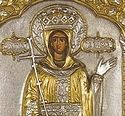

| Previous day | Next day |
| Old Style
September 11
|
Tuesday |
New Style
September 24
|
| 14th Week after Pentecost. Tone 4. | No fast.
|
![]() Afterfeast of the Nativity of the Theotokos.
Afterfeast of the Nativity of the Theotokos. ![]() St. Theodora of Alexandria (490).
St. Theodora of Alexandria (490). ![]() Translation of the relics of Sts. Sergius and Herman of Valaam (1542-1550).
Translation of the relics of Sts. Sergius and Herman of Valaam (1542-1550). ![]() St. Silouan, elder, of St. Panteleimon Monastery, Mt. Athos (1938).
St. Silouan, elder, of St. Panteleimon Monastery, Mt. Athos (1938).
Martyrs Demetrius, his wife Evanthia, and their son Demetrian, at Skepsis on the Hellespont (1st c.). Martyr Ia of Persia and 9,000 martyrs with her (362-364). St. Euphrosynus the Cook, of Alexandria (9th c.). Martyrs Diodorus, Didymus, and Diomedes, of Laodicea (362-364). Glorification of St. Xenia of St. Petersburg, fool-for-Christ (1978). St. John, abbot, of Svyatogorsk Monastery (1970). Synaxis of the Saints of the Svatogorsk Monastery.
Weeping Kazan Icon of the Most Holy Theotokos “Of Kaplunovka.” (1689)
Martyrs Serapion, Cronides, and Leontius, of Alexandria (237). St. Paphnutius the Confessor, bishop in the Egyptian Thebaid (4th c.). St. Deiniol, abbot and bishop, of Bangor, Wales (584). Holy Martyr Theodora of Vasta in the Peloponnese. St. Elias the Cave-dweller, of Calabria (ca. 960).
Repose of the young Elder Melchizedek of Mzensk (1846).
Thoughts for Each Day of the Year
According to the Daily Church Readings from the Word of God
By St. Theophan the Recluse

Tuesday. [II Cor. 12:20-13:2; Mark 4:24-34]
The parable about the gradual growth of wheat from seed portrays, with respect to each man, the gradual growth of what is hidden in a man’s heart, sown and watched over by God’s grace, while with respect to mankind—the gradual increase in the body of the Church or the community of those saved in the Lord Jesus Christ, according to the order established by Him. Through this parable the question is settled: why to this day is Christianity not universal? Just as a man who has cast seed into the ground sleeps and rises, and the seed sprouts and grows up on its own without his knowing how, so the Lord, placing the seed of Divine life on the ground has given it freedom to spread on its own, subordinating it to the natural flow of events, and not forcing them. He only watches over the seed, assists it in individual circumstances and gives the general direction. The reason for this lies in man’s freedom. The Lord wants man to submit to Him on his own, and awaits the inclination of his freedom; this affair takes time. If all depended only on God’s will, everyone would have been a Christian long ago. Another thought: the body of the Church is being created in heaven; from the earth enter only materials, formed also by heavenly agents. The word passes over the earth from heaven and attracts those who desire it. Those who take heed and follow enter, like raw material, into God’s laboratory, the Church, and here are remade according to patterns given from heaven. Those who are remade, upon departure from this life, pass into heaven and there enter into the house of God, each where he is fit. This goes on continuously, and consequently the work of God does not stand still. A universal solemn celebration of Christianity is not required for this. The house of God is created invisibly.
Articles
 Venerable Sergius the Wonderworker of ValaamSaints Sergius and Herman settled on the island of Valaam in 1329. |
 Venerable Herman the Wonderworker of ValaamSaints Sergius and Herman settled on the island of Valaam in 1329. The brethren gathered by them spread the light of Orthodoxy in this frontier land. |
 St. Euphrosynus the Cook, of AlexandriaSaint Euphrosynus the Cook was from one of the Palestinian monasteries, and his obedience was to work in the kitchen as a cook. |
 Holy Hierarch Deiniol, Bishop of Bangor in WalesDmitry LapaSt. Deiniol (the Welsh from of Daniel) lived in the sixth century. He was a descendant of one Celtic ruler in Northern Britain. |








